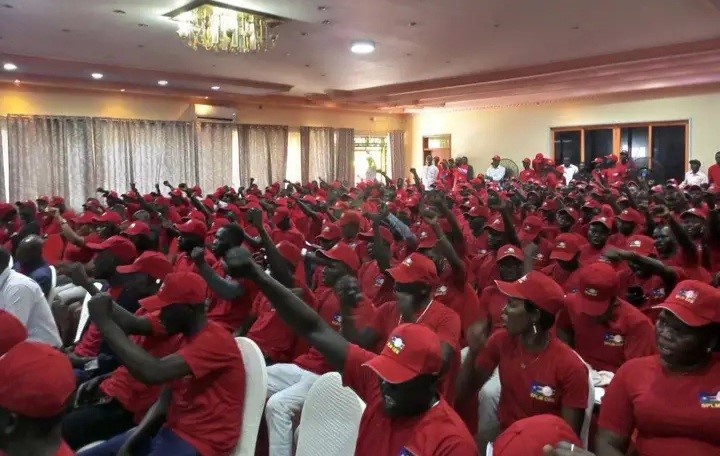The fact that South Sudan achieved various milestones in implementing the 2018 Revitalised Peace Agreement is worth all the applause. But it was a journey that tagged along with political games of wits that gave a snippet of what the country’s political future may look like.
As the 2024 election inches closer, as anticipated in the roadmap, political parties led by the SPLM and the SPLM-IO have been busy fixing the bolts ahead of what looks like a grueling battle. The battles could not only be for votes but even for the names of political parties that will resonate with voters’ aspirations.
The SPLM has lately initiated changes pursuant to its disintegration in the bitter fallout of 2013, which led to the formation of the SPLM Former Detainees (FDs), the Real SPLM, SPLM-IO, and SPLM-IG.
The ruling party conducted a Political Bureau (PB) meeting in August, followed by the National Liberation Council (NLC) meetings, which paved the way for the restructuring of the party.
The recent PB meeting proposed the removal of Dr Riek Machar as deputy party chair and Pagan Amum as secretary general, citing the duo’s past decision to ditch the party.
The SPLM Secretary-General, Peter Lam Both, argued that the two leaders lost their membership after forming different parties.
“The PB also recommends the National Liberation Council (NLC) for the replacement of Cde Pagan Amum and Cde Riek Machar in the structures of the SPLM as they have already forfeited their membership by establishing other political parties,” Lam said.
The Political Bureau also recommended the replacement of SPLM members who had died, as well as authorising the SPLM party’s chairman, President Salva Kiir, to expand the SPLM Political Bureau membership from 19 to 35.
Former Detainees (FDs) and SPLM-IO leaders, such as Vice President Rebecca Nyandeng de Mabior and Vice President Taban Deng Ghai, were also forced to dissolve their organisations and join President Kiir’s party.
The amalgamation, which, according to the SPLM, was the fulfillment of the Arusha SPLM Reunification Agreement signed in 2015, was a crucial political event meant to consolidate peace.
The party would then crack its whip on the peace partner, Dr Machar, in December 2022, saying he had defied the spirit of party unity by forming a splinter party after the 2013 fallout.
According to a statement read out on state-owned television, Kiir, who is also the country’s president, confirmed James Wani Igga as the First Deputy Chairperson of SPLM, Daniel Awet Akot as second deputy chairperson, Kuol Manyang Juuk as third deputy chairperson, Peter Lam Both as secretary-general, Akol Paul Kordit as the first deputy secretary-general, and Tulio Odongi as second deputy secretary-general.
‘Unrecognised move’
However, the Machar-led SPLM-IO party rejected the restructuring of the party’s leadership, arguing that the spirit of the Arusha agreement never accommodated such decisions, and thus the SPLM acted unilaterally and illegally.
Puok Both Baluang, the press secretary in the Office of the First Vice President, would then say that Machar was elected through the SPLM convention and would only be replaced by the same convention when the Arusha agreement is implemented and all factions become one.
Baluang argued that the business that the ruling party engaged in was a restructuring of “SPLM-IG and not SPLM.”
“What happened here in Juba a few days ago was not the SPLM’s NLC, but the SPLM IG’s NLC,” he explained.
According to Baluang, the SPLM-IO, FDS, and Real SPLM were not parties to the convention that took place in Juba on Friday, hence the meeting lacked the spirit of the Arusha Agreement.
Baluang warned that lack of cooperation in restructuring the ruling party risked soiling the gains made in the revitalised peace agreement.
“I would like to advise the SPLM IG to refrain from any activity that may jeopardise the process of implementing the peace agreement in Arusha and ARCISS, and instead to focus on issues that can bring the country together,” he said.
However, in a separate interview in October 2022, Santo Malek Anai, the SPLM Deputy Secretary for Political Affairs and Mobilization, defended the removal of Machar and Amum.
“Arusha agreement has been implemented for those who have decided to come back; the FDs and the IOs have come back already,” Anai said.
“The Taban’s faction is already with us, and he has already come with the group and has been integrated, he is behind the SPLM; the FDs came back with all of them, Mama Rebecca is now with us; even yesterday she was in the meeting with Cde Taban,” he revealed.
He said the restructuring of the SPLM’s top members would not interfere with the agreement, nor would it contradict the Arusha reunification.
With the squabbles over the SPLM’s soul reaching a fever pitch, political scientist Abraham Kuol Nyuon blames the political heat on the election headache.
Nyuon says all the factions (SPLM groups) want to use the name SPLM in their political activities in order to get more supporters for the upcoming election.
But for now, it remains a guess as to who will walk away with the prize: getting the SPLM name tag.






